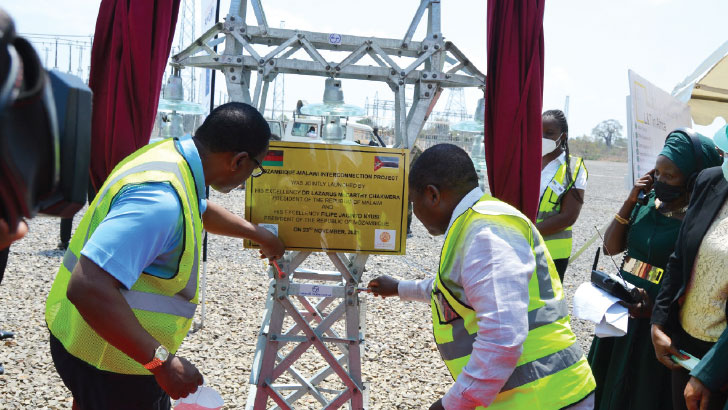Malawi, Mozambique set pace for power project
President Lazarus Chakwera says the Mozambique-Malawi Power Transmission Interconnection Project will upgrade the country’s profile from an observer to a fully operational member of the Southern African Power Pool (Sapp).
The President outlined the expectation yesterday when he alongside visiting Mozambique President Felipe Nyusi presided over the launch of construction works for the 218-kilometre (km) 400 kilovolt high voltage transmission line.
The interconnector will run from Matambo in Mozambique’s central Tete Province into Malawi through Mwanza and Neno districts to Phombeya in Balaka.

Speaking during the launch at Phombeya, Chakwera said the project will establish a transmission link between Malawi and Mozambique for an initial 50 megawatts (MW) of power to Malawi. He said this will help increase availability of power.
He said the interconnector, which covers 76km on the Malawi side and 142km in Mozambique, will also create avenues for trade in Sapp with the prospect of more exchanges of trade and power in the future.
Chakwera said: “With the construction of the Malawi/Mozambique Interconnector, our march towards the goal of adding 1 000MW to the national grid over the next four years is making steady progress.
“Our thanks for this project and the 1 000 jobs it will create goes to the Mozambican Government, but also to our funding partners, including the World Bank, the German development bank KfW and the European Bank for shouldering a cost of $154 million dollars [about K127 billion] between them.”
He said the cooperation with traditional donors is boosting his government’s efforts to build a new Malawi that is self-reliant and inclusively wealthy by 2063.
Speaking earlier, Nyusi touted the project as exceptional and urged commitment from the two governments.
He said the new energy project is key to achieving development in both countries.
“Willingness is not enough, but the vision which must be actualised by concrete development plans,” said Nyusi who largely spoke in Portuguese.
Minister of Finance Felix Mlusu said besides Malawi’s immediate guaranteed access to import 50MW of power from Mozambique, the country will have access to additional imports of power within the Sapp of up to 200MW initially and also possible exports of power within the same region.
He said this is critical to the economic development activities in Malawi and an important input to the delivery of Malawi 2063, the country’s long-term development strategy.
Mlusu hailed the World Bank and KfW in the two countries as well as the Norwegian Trust Fund in Mozambique for co-financing the project.
“I, therefore, extend my appreciation for the support on this project and all other projects in our two countries. It is pleasing to also note that the majority of the financial support for this project is a grant,” he said.
Electricity Supply Corporation of Malawi (Escom) board chairperson Frederick Changaya thanked the Malawi Government for providing Escom with $3.5 million for a resettlement action plan to facilitate the start of the project in Malawi.
He also pledged his organisation’s commitment to complete the project by 2023 as planned.
Speaking on behalf of the European Union, German Ambassador Ralph Timmermann said the increase and stabilisation of power supply resulting from this project will improve access to clean energy in Malawi and consequently contribute towards sustainable development growth.
The objective of this project is to contribute to economic growth of the region through sustainable power access by integrating Malawi electricity market to the Sapp to balance power deficit through regional power sharing.
Malawi now faces a 298MW power generation deficit following the commissioning of the 19.1MW Tedzani IV Hydro Power Station in July and the JCM Matswani Solar Corporation Limited 60MW plant in Salima commissioned last week.
The country’s current electricity demand is projected at about 800MW.






One Comment